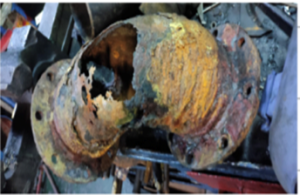The Charity
Aviation
Maritime
M2028

Initial Report
[Forwarded to CHIRP by ISWAN with the reporters consent]
A seafarer complained about awful working conditions on board their ship. The accommodation was unhygienic, food was insufficient, and the equipment in a state of disrepair: the main engine and gearbox leaked oil and the seafarer claimed that oil and garbage was frequently discharged overboard. The air conditioning was also broken.
The reporter stated that the chief officer was blackmailing the crew by threatening that anyone who reported the poor conditions would be dismissed.
CHIRP Comment
The reporter initially contacted ISWAN with their concerns. Because of the obvious safety implications, and with the reporter’s consent, these were then passed to CHIRP. Shortly after CHIRP received this report, the vessel was detained by the coastal state when it next docked and the crew repatriated.
The photos suggest that the vessel has not been compliant with minimum regulations for a considerable time, yet this was not detected by any external audit. This is not an isolated case and CHIRP regularly receives similar reports. The number of vessels with unseaworthy or poor conditions remains stubbornly high, despite there being numerous international and national regulations regarding minimum safety, environmental and welfare standards? Flag states are obliged to enforce standards but there are few consequences in international law if a flag state fails to do so adequately.
Capacity and resource limitations reduce the number of inspections that a port state may be able to conduct, so substandard vessels like this one are able to operate for a considerable time before being identified and detained. Seafarers on board unseaworthy or non-compliant vessels are encouraged to contact CHIRP, who will advocate on their behalf.
CHIRP remains the confidential, independent and impartial voice of the mariner, whose safety remains our priority.
Key Issues relating to this report
Alerting- The ship’s crew have been responsible for raising this matter to ISWAN and CHIRP, which is commendable. Alerting by internal and external audits process have failed.
Competency– The management company do not have the necessary skills to run a ship in conformity with the ISM code. There appears to be a total lack of adherence to the requirements of the Code. CHIRP has stated that the Code is the minimum standard that should be applied. The RO and Flag for this company must do more to achieve the minimum standard.
Pressure (Commercial)- The threats by the Chief Officer suggest that commercial considerations have contributed to a culture where violations of environmental, welfare and safety standards are not just tolerated, they are expected.
Capability – Do Flag and port State have the capability to strictly enforce minimum standards? According to records which have allowed the ship to keep operating in this condition, the flag state appears to have not carried out any quality control inspection.







